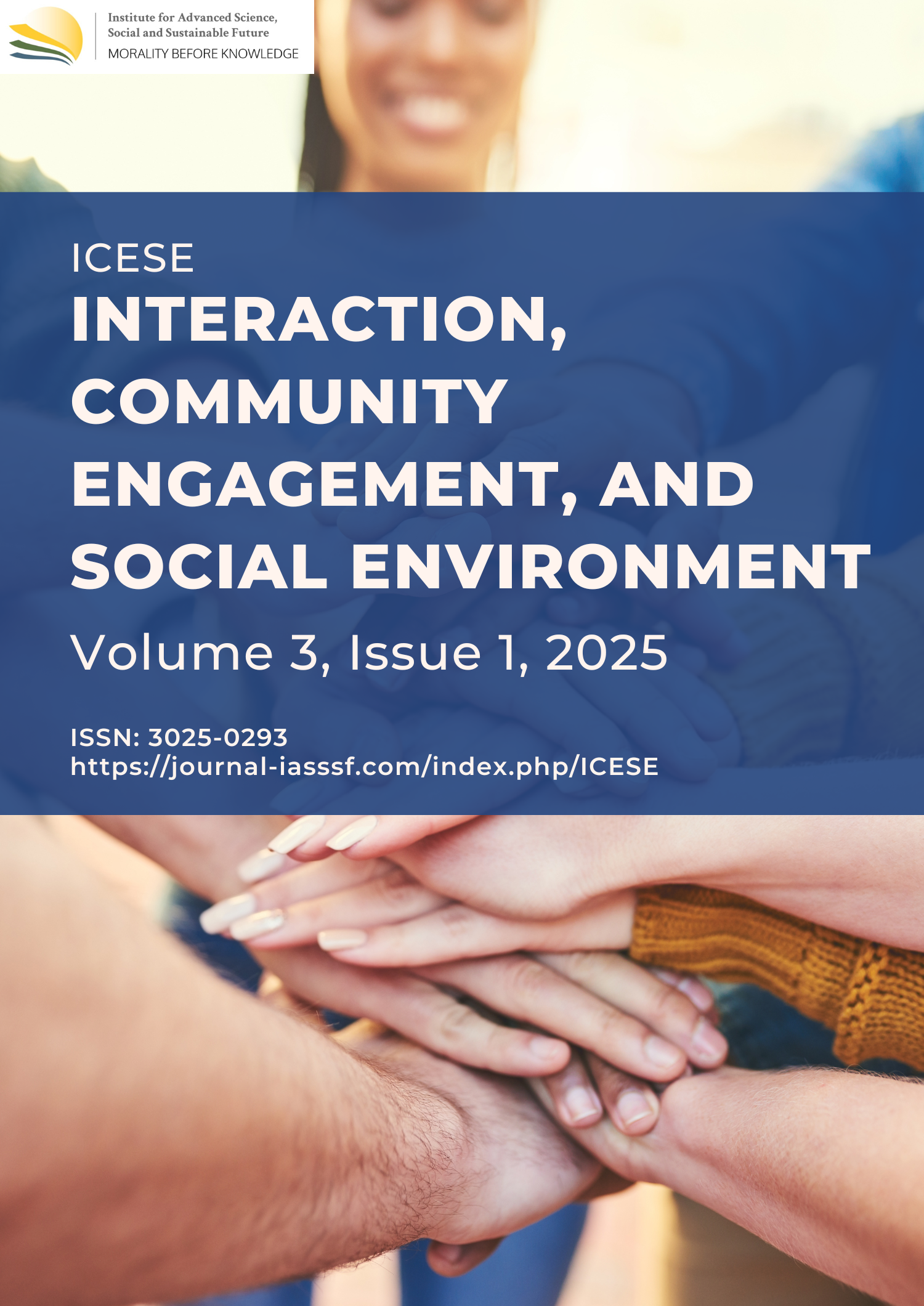The role of energy transition in anticipating the impacts of climate change
DOI:
https://doi.org/10.61511/icese.v3i1.2025.2087Keywords:
climate justice, energy transition, energy policy, energy justice, renewable energyAbstract
Background: Climate change has emerged as one of the most pressing global challenges in the 21st century, with Indonesia an archipelagic and tropical nation being particularly susceptible to its consequences. Despite its enormous renewable energy (RE) potential of over 3,600 GW, Indonesia remains heavily dependent on fossil fuels, especially coal, which contributes significantly to greenhouse gas emissions and environmental damage. This study aims to analyze Indonesia’s energy transition strategy through the lens of climate justice, emphasizing the importance of an inclusive and equitable transformation. Previous research has underscored the critical role of distributive, procedural, and recognition justice in enabling fair energy transitions. Methods: This study applies a qualitative-descriptive approach using literature-based research. It draws on national policies, legal documents, academic journals, and global reports to evaluate Indonesia's energy transition framework. The analysis is grounded in the energy justice framework, which examines equity in energy distribution (distributive), inclusiveness in decision-making (procedural), and acknowledgment of vulnerable groups (recognition). Findings: The results show that Indonesia’s energy transition efforts are evolving but face significant challenges, including regulatory uncertainty, limited investment, and institutional rigidity. Although policy measures like the Just Energy Transition Partnership (JETP) and Presidential Regulation No. 112/2022 represent a shift towards a cleaner model, actual renewable energy installed capacity remains under 1%. Structural barriers such as fossil fuel subsidies and bureaucratic delays hamper progress. Integrating justice principles can enhance effectiveness by ensuring fair access, local empowerment, and participatory policy design. Conclusion: Indonesia’s energy transition is a vital strategy to mitigate climate change but must be rooted in justice to ensure inclusivity and sustainability. Strong policy coordination, stakeholder collaboration, and innovative financing mechanisms are necessary for success. Novelty/Originality of this article: This study offers a novel contribution by placing energy justice at the center of the analytical framework, unlike most existing literature on JETP or energy policy in Southeast Asia, which primarily focuses on financing mechanisms, technical pathways, or climate mitigation goals. By integrating environmental, socio-political, and governance dimensions, this research provides a comprehensive, justice-oriented evaluation of energy transitions, particularly relevant for developing countries where equity, participation, and local impact are often underexplored.
References
Aditya, I. A., Wijayanto, T., & Hakam, D. F. (2025). Advancing renewable energy in Indonesia: A comprehensive analysis of challenges, opportunities, and strategic solutions. Sustainability, 17(5). https://doi.org/10.3390/su17052216
Azubuike, S. I., Emeseh, E., & Amakiri, D. Y. (2024). Climate change, energy transition, and the Global South: Learnings from the international framework on the ozone layer. Journal of Energy & Natural Resources Law, 42(3), 255–277. https://doi.org/10.1080/02646811.2024.2345012
Bappenas. (2025). Kebijakan strategi dan penahapan pembangunan rendah karbon dalam RPJPN 2025-2045: Upaya mencapai net zero emissions. Badan Perencanaan Pembangunan Nasional. https://www.bappenas.go.id
Bindi, L., Smith, A., & Jones, M. (2025). Assessing social impacts and energy justice along green hydrogen supply chains. Energy Research & Social Science, 85, 102400. https://doi.org/10.1016/j.erss.2025.102400
Bräuchler, B. (2025). Golden Indonesia 2045: Neoliberal development policies and environmental journalism. Journal of Current Southeast Asian Affairs. Advance online publication. https://doi.org/10.1177/18681034251345832
Brodjonegoro, B. (2024, November 4). Transisi energi perlu berlangsung secara adil dan terarah. Institute for Essential Services Reform (IESR). https://iesr.or.id/transisi-energi-perlu-berlangsung-secara-adil-dan-terarah
Climate Transparency. (2020). Climate Transparency report: Comparing G20 climate action and responses to the COVID-19 crisis – Indonesia country profile. Climate Transparency. https://www.climate-transparency.org/media/indonesia-country-profile-202
Embassy, T. D. (2017). Technology data for the Indonesian power sector: Catalogue for generation and storage of electricity. Dewan Energi Nasional, Kementerian Energi dan Sumber Daya Mineral.
Erdiwansyah, E., Gani, A., Nurdin, M. H., Mamat, R., & Sarjono, R. E. (2022). Policies and laws in the application of renewable energy in Indonesia: A review. AIMS Energy, 10(1), 23–44. https://doi.org/10.3934/energy.2022002
Fathoni, H., & Setyowati, A. (2022). Energy justice for whom? Territorial (re)production and everyday state-making in electrifying rural Indonesia. Geoforum, 135, 49–60. https://doi.org/10.1016/j.geoforum.2022.07.012
Fifianny, H., & Setiabudy, R. (2025). Potensi energi listrik dari penggunaan PLTS atap. Syntax Literate: Jurnal Ilmiah Indonesia, 9, 9159–9167. https://doi.org/10.36418/syntax-literate.v9i12.55850
G20. (2022a). Bali Compact. https://g7g20-documents.org/database/document/2022-g20-indonesia-sherpa-track-energy-ministers-ministers-language-bali-compact
G20. (2022b). Bali Energy Transitions Roadmap. https://g7g20-documents.org/database/document/2022-g20-indonesia-sherpa-track-energy-ministers-miscellaneous-decade-of-actions-bali-energy-transitions-roadmap
Hansen, J. E., Sato, M., Simons, L., Nazarenko, L. S., Sangha, I., Kharecha, P., …, & Li, J. (2023). Global warming in the pipeline. Oxford Open Climate Change, 3(1), kgad008. https://doi.org/10.1093/oxfclm/kgad008
Hidayat, T. (2022). Wind power in Indonesia: Potential, challenges, and current technology overview. In Indonesia Post-Pandemic Outlook: Strategy towards Net-Zero Emissions by 2060 from the Renewables and Carbon-Neutral Energy Perspectives (pp. 109–132).
Horst, D. van der, Grant, R., Mejía-Montero, A., & Garneviciene, A. (2021). Energy justice and social acceptance of renewable energy projects in the Global South. In Social Acceptance of Renewable Energy Infrastructures (pp. 217–234). Springer. https://doi.org/10.1007/978-3-030-73699-6_12
IEA. (2022). Nuclear power and secure energy transitions. International Energy Agency. https://www.iea.org/reports/nuclear-power-and-secure-energy-transitions
IESR, UNDP Indonesia, & Ministry of Energy and Mineral Resources. (2024). Just Energy Transition Center (JETC), Banten & West Java: Displaced factory workers and farmers; Solar Energy Training for Women, East Nusa Tenggara (NTT): Housewives & informal sector workers. https://www.undp.org/indonesia/projects/indonesia-just-energy-transition-partnership-jetp
Jati, G. (2024, March 28). Cermat merancang kerangka kebijakan energi Indonesia. IESR. https://iesr.or.id/cermat-merancang-kerangka-kebijakan-energi-indonesia
Kartika, I. G. A. P., Astarini, I. A., Yasa, P. G. A. S., Hermanto, B., & Kriviņš, A. (2025). Quo Vadis Energy Legal Policy towards Equitable and Sustainable Development in Indonesia. LAW REFORM, 21(2), 266-294. https://doi.org/10.14710/lr.v21i2.66743
Lim, M., Jørgensen, P., & Wyborn, C. (2018). Reframing the sustainable development goals to achieve sustainable development in the Anthropocene—a systems approach. Ecology and Society, 23. https://doi.org/10.5751/ES-10182-230322
Loy, M., Suyanto, S., & Hidayat, D. (2024). Barriers to Indonesia’s energy transition. The Indonesian Journal of Public Administration, 10(1), 45–60. https://doi.org/10.1234/ijpa.2024.20301
Massagony, A., Pandit, R., & White, B. (2025). Political economy of energy policy in Indonesia towards net zero emissions by 2060. Energy for Sustainable Development, 88, 101757. https://doi.org/10.1016/j.esd.2025.101757
Ministry of Energy and Mineral Resources. (2021). Rencana Aksi Nasional Tujuan Pembangunan Berkelanjutan (SDGs) 2021–2024. Kementerian Energi dan Sumber Daya Mineral. https://esdm.go.id/id/publikasi/rencana-strategis
Ministry of Finance. (2022). CIF Accelerating Coal Transition (ACT): Indonesia country investment plan (IP). Badan Kebijakan Fiskal.
Mubarok, M. W. S. U., & Kartini, E. (2023, October). Analysis of renewable energy as export commodity (case study Indonesia-ASEAN). In AIP Conference Proceedings (Vol. 2932, No. 1, p. 030004). AIP Publishing LLC. https://doi.org/10.1063/5.0174702
Pambudi, N. A., Firdaus, R. A., Rizkiana, R., Ulfa, D. K., Salsabila, M. S., Suharno, & Sukatiman. (2023). Renewable energy in Indonesia: Current status, potential, and future development. Sustainability, 15(3). https://doi.org/10.3390/su15032342
Priatna, D., & Monk, K. A. (2023). Climate change and its implications on wildlife conservation. Indonesian Journal of Applied Environmental Studies, 4(2), 64–66. https://doi.org/10.33751/injast.v4i2.9661
Pribadi, A. (2023, February 4). Siaran pers nomor: 060.Pers/04/SJI/2023. Kementerian Energi dan Sumber Daya Mineral. https://www.esdm.go.id/id/media-center/arsip-berita/miliki-potensi-ebt-3686-gw-sekjen-rida-modal-utama-jalankan-transisi-energi-indonesia
PT PLN (Persero). (2017). Rencana Usaha Penyediaan Tenaga Listrik (RUPTL) 2017–2026. PT PLN (Persero). https://web.pln.co.id/stakeholder/ruptl
Pulungan, Z. M., Sianturi, G. A. S., Lubis, H. K., & Effendy, K. F. (2025). Analisis wilayah tanpa akses listrik di Provinsi Jawa Barat menggunakan software QGIS. STATMAT: Jurnal Statistika dan Matematika, 7(1), 54-60. https://doi.org/10.32493/sm.v7i1.48628
Regulation of the Minister of Energy and Mineral Resources of the Republic of Indonesia. (2024). Peraturan Menteri Energi dan Sumber Daya Mineral No. 2 Tahun 2024 tentang Pembangkit Listrik Tenaga Surya Atap yang Terhubung pada Jaringan Tenaga Listrik Pemegang Izin Usaha Penyediaan Tenaga Listrik untuk Kepentingan Umum. Kementerian Energi dan Sumber Daya Mineral. https://jdih.esdm.go.id/dokumen/view?id=2428
Sisdwinugraha, A. P., & Hapsari, A. (2025). Indonesia Energy Transition Outlook (IETO) 2025: Navigating Indonesia’s Energy Transition at the Crossroads: A Pivotal Moment for Redefining the Future. Institute for Essential Services Reform (IESR). https://iesr.or.id/en/pustaka/indonesia-energy-transition-outlook-ieto-2025
Tureah, G. (2025, February 6). The country of perpetual potential: Indonesia’s barriers in renewable energy transition. Chicago Policy Review. http://chicagopolicyreview.org/2025/02/06/the-country-of-perpetual-potential-indonesias-barriers-in-renewable-energy
Van Uffelen, N. (2022). Revisiting recognition in energy justice. Energy Research & Social Science, 92, 102764. https://doi.org/10.1016/j.erss.2022.102764
Vögele, S., Govorukha, K., Mayer, P., Rhoden, I., Rübbelke, D., & Kuckshinrichs, W. (2023). Effects of a coal phase-out in Europe on reaching the UN Sustainable Development Goals. Environment, Development and Sustainability, 25(1), 879–916. https://doi.org/10.1007/s10668-021-02083-8
Downloads
Published
How to Cite
Issue
Section
Citation Check
License
Copyright (c) 2025 Handi Wilujeng Nugroho

This work is licensed under a Creative Commons Attribution 4.0 International License.















